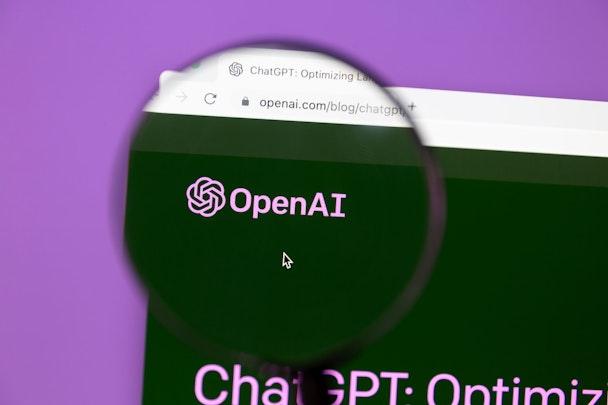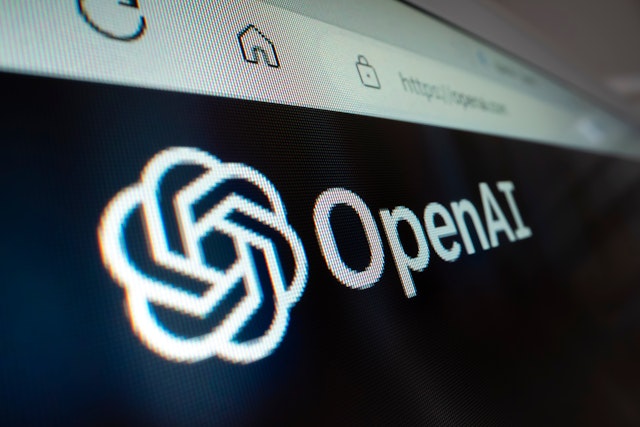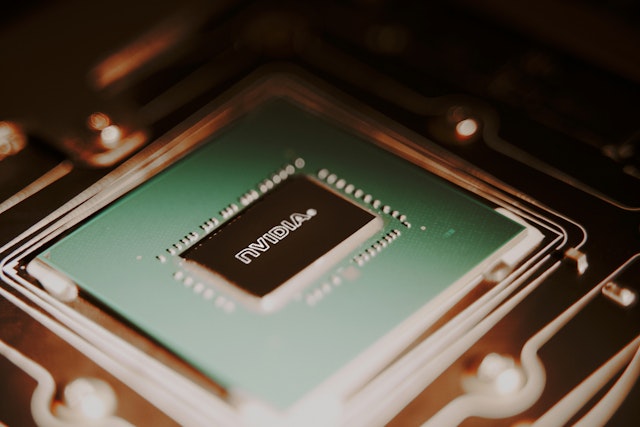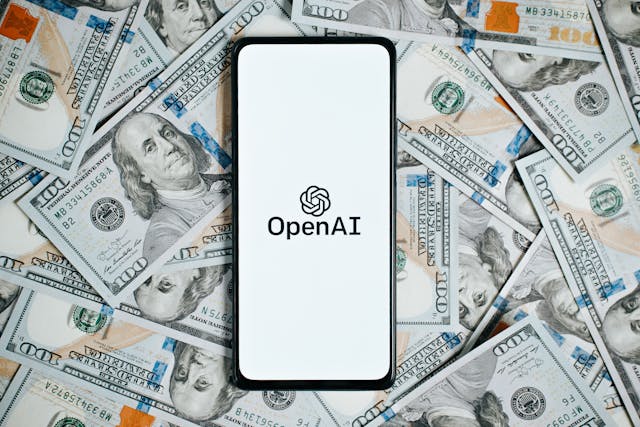Weekly AI recap: OpenAI’s GPT store, Nvidia’s new GPUs
It has been yet another big week in the world of AI. And, as has so often recently been the case, OpenAI has found itself at the center of the news cycle. Here’s an overview of some of the biggest AI stories from the past week.

OpenAI's nonprofit status came under closer scrutiny this week. / Adobe Stock
OpenAI launches GPT store

OpenAI announced on Wednesday in a company blog post that it had officially launched its GPT store, an online marketplace where users can browse, purchase and sell custom GPTs – versions of ChatGPT designed to provide assistance with a specific task. Popular GPTs on the store will be featured on a leaderboard, which will be divided into categories such as writing, lifestyle and education, similar to the format found in Apple’s App Store.
The company mentioned in the same blog post that later in Q1 of this year, it will introduce a program that will enable GPT builders (starting with those in the US) to make money through user engagement.
Nvidia announces new GPUs for “local” AI systems

US chipmaker Nvidia announced on Monday that it will be releasing three new graphic processing units, or GPUs – the chips that have been driving the ultra-compute-heavy generative AI boom – for “local” AI systems that can be hosted from a personal computer: the RTX 4060 Super, RTX 4070 Ti Super and the RTX 4080 Super. The three new chips will reportedly be priced between $599 and $999 apiece.
As the world’s leading manufacturer of GPUs, Nvidia’s market value has skyrocketed over a short span of time to more than $1tn. Many prominent AI companies, including OpenAI, have relied on Nvidia’s GPUs to provide the immense computational power that’s required to train large language models (LLMs). (OpenAI CEO Sam Altman has teased the idea of starting his own GPU manufacturing operation, citing scarcity concerns.)
The three new chips are intended mainly for gaming, one of the main forms of media for which GPUs were originally invented. But they’re also intended to supercharge AI: the RTX 4080 Super will, for example, be able to create AI-generated video 150% faster than Nvidia’s previous model, according to CNBC.
All three new RTX GPUs are slated to be released at different dates before the end of January. They’ll reportedly be compliant with US sanctions and thereby shareable with China.
Advertisement
Consumer advocacy group challenges OpenAI’s nonprofit status

Consumer advocacy nonprofit Public Citizen published a letter to California Attorney General Robert Bonta on Tuesday urging an investigation into OpenAI’s status as a 501(c)(3) nonprofit.
The letter argues that recent turmoil within OpenAI – beginning with the company’s board’s sudden and as yet unexplained November decision to fire its CEO Sam Altamn and culminating five days later in Altman’s reinstatement as CEO and the shuffling of the company’s board members – has left the company unable to fulfill its founding mission: “Creating safe AGI that benefits all of humanity,” as it’s stated on OpenAI’s website.
“Recent events raise concerns that OpenAI, Inc. may have failed to carry out its nonprofit purposes and is instead acting under the effective control of its for-profit subsidiary affiliate,” the letter to Bonta states. “I urge you to investigate whether OpenAI is not acting to carry out its purpose and, if appropriate, to seek its dissolution, divestment of its assets and reinvestment of those assets to charitable purpose.”
OpenAI has an unusual governance structure. As its name suggests, the company was founded as a nonprofit AI research lab in 2015. It launched a for-profit subsidiary – officially known as Open AI Global LLC – in 2019 in an effort to raise money, in part for the significant computing power that’s required to train data-hungry large language models. “It became increasingly clear that donations alone would not scale with the cost of computational power and talent required to push core research forward, jeopardizing our mission,” OpenAI wrote in a blog post published last summer. “So we devised a structure to preserve our nonprofit’s core mission, governance and oversight while enabling us to raise the capital for our mission.”
Under this “capped profit” model, the company is governed by a board of directors who (theoretically) have the power to exercise final authority over the company’s operations – including, as we recently saw, firing its CEO.
“That the [OpenAI] board seems to have been replaced precisely for trying to exercise its core duties suggests that the nonprofit is the subordinate partner,” Tuesday’s letter states. “The closest observers of the tumult at OpenAI tell a consistent story about why Altman was brought back – for-profit interests overtook the nonprofit.”
Advertisement
OpenAI responds to New York Times copyright infringement lawsuit

Another major update from OpenAI: On Monday, the company responded in an official blog post to a lawsuit filed by The New York Times on December 27, which claims that the tech company illegally used millions of copyrighted Times articles in order to train its GPT large language model.
In the blog post titled OpenAI and Journalism, the company claimed that the lawsuit was “without merit,” primarily because the culling of online data published by news sources constitutes fair use – an argument that the tech company wrote is “supported by long-standing and widely accepted precedents.” US courts are currently working to determine whether or not the fair use argument in the context of generative AI is sound.
The tech company also wrote that the Times did not provide all of the salient facts when it argued in its lawsuit, citing examples, that GPT-4 was liable to recreate verbatim content that it had originally published. “It seems they intentionally manipulated prompts, often including lengthy excerpts of articles, in order to get our model to regurgitate,” the blog post reads. “Even when using such prompts, our models don’t typically behave the way The New York Times insinuates, which suggests they either instructed the model to regurgitate or cherry-picked their examples from many attempts.”
The blog post described regurgitation as a “rare bug” found in GPT-4 that OpenAI was working to eliminate.
Above all, the blog post sought to position OpenAI as an ally to the established journalistic order: “Our goals are to support a healthy news ecosystem, be a good partner and create mutually beneficial opportunities,” the company wrote, adding that it had been in talks with the Times around the possibility for “a high-value partnership” in the period leading up the filing of the lawsuit. The company has already partnered with the Associated Press, Axel Springer, the American Journalism Project and New York University’s Arthur L Carter Journalism Institute.
Suggested newsletters for you
Walmart unveils new generative AI-powered online shopping experience

Walmart, one of the wealthiest retailers in the world, has partnered with Microsoft to introduce a new generative AI-powered feature aimed at providing customers with a simplified shopping experience. The feature – unveiled on Tuesday at the Consumer Electronics Show (CES) in Las Vegas – was built upon “a combination of Walmart proprietary data and technology and large language models, including those available in Microsoft Azure OpenAI Service, as well as retail-specific models built by Walmart,” Shelley Bransten, corporate vice-president, global retail, consumer goods and gaming industries at Microsoft wrote in a company blog post.
The retail giant’s new search function will enable online customers to enter a broad shopping query and instantly receive product recommendations. For example, an online shopper might enter the text prompt: “Help me plan a Super Bowl party,” at which point they might receive links to salty snacks, soda, paper plates and other typical accouterments for such an event. The blog post added that shoppers will soon “have a more interactive and conversational experience, get answers to specific questions and receive personalized product suggestions.”
“Generative AI in retail is particularly exciting as it can help usher in a new way of shopping, shifting from ‘scroll searching’ to ‘goal searching,’ which makes the digital shopping experience more seamless and intuitive,” Bransten wrote.
Sag-Aftra strikes deal with AI voiceover company Replica Studios

The Screen Actors Guild-American Federation of Television and Radio Artists (Sag-Aftra), the labor union that represents actors, has signed a deal with AI-generated voiceover company Replica Studios. The agreement enables union members to license AI-generated versions of their voices for use in video games.
The growing presence of AI in media was a core focus in Sag-Aftra’s recent strike against the Alliance of Motion Picture and Television Producers, which began in July and didn’t end until a deal was reached in November, making it the union’s longest-running strike since the Screen Actors Guild was founded in 1933.
“With this agreement, we have achieved fully informed consent and fair compensation when it comes to the use of our members’ voices and performances,” Sag-Aftra national executive director and chief negotiator Duncan Crabtree-Ireland said in a statement. “We are proud to work with Replica in leading the way to make it easy for these companies to access Sag-Aftra’s world-renowned talent in an ethical manner that ensures consent and fair compensation for their contributions. This agreement also paves the way for other companies to follow their lead.”
ChatGPT on wheels: Volkswagen EVs will soon offer more sophisticated AI-powered personal assistants

Volkswagen has partnered with software company Cerence to bring ChatGPT to the auto giant’s Ida voice assistant. Announced earlier this week at CES, the integration will allow drivers to pose complex questions to Ida and receive verbal responses from ChatGPT. The software upgrade will reportedly take place within select VW vehicles – starting with the ID.3 and the ID.4 – in the second quarter of this year; no personal OpenAI account is required.
Mercedes-Benz also announced at CES that its MBUX virtual assistant would receive an LLM-powered upgrade.
For more on the latest happenings in AI, web3 and other cutting-edge technologies, sign up for The Emerging Tech Briefing newsletter.

